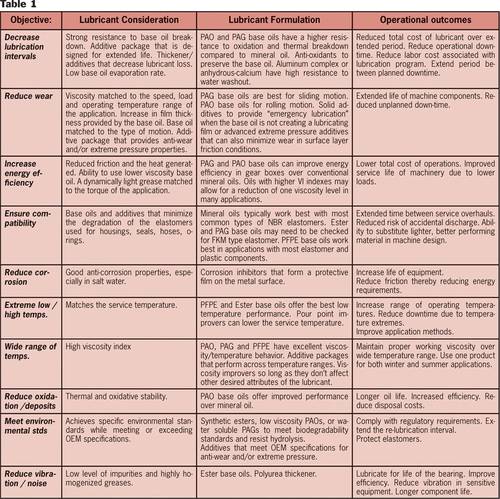Proper Applications for Specialty Lubricants
Specialty lubricants are used in a variety of applications, but what factors should you consider? Depending on the situation, specialty lubricants can complement an existing program, in order to obtain maximum efficiencies.
Often, shipboard use of lubricants is influenced by two general objectives – rationalization of the lubricant inventory and cost management. Vessels have limited storage space and complex logistics supply systems. This creates a strong incentive to source lubricants that can be applied to several applications. Furthermore, the maritime industry is a cost-conscious industry where profits can be difficult to attain, leading to a desire to reduce operating costs. The result is often a preference among operators for less expensive, multipurpose lubricants. However, as machinery has been developed to operate under increased demands to deliver specific benefits and as owner/operators strive to increase the life of the machinery and meet new requirements from governments and OEMs, specialty lubricants should be considered to assist in delivering the operational objective of the application.
Specialty lubricants are designed to provide optimal performance for specific applications. Whether the objective is to reduce energy consumption, increase the lifespan of your equipment, reduce total operating cost, extend time between dry-docks, or meet a regulatory requirement, choosing the correct lubricant can help meet a number of objectives.
The Science of lubrication
Lubrication is required to reduce friction developed when moving surfaces are in contact with each other. “Tribology – the study of friction, lubrication and wear” – considers the speed, temperature, load, type of motion, materials in contact and operating environment of the application to determine the best chemistry of lubricant components to minimize the friction. Types of motion include sliding, micro-sliding, rolling, and oscillating, as well as motions that combine rolling and sliding. Operating environments can include moisture, vacuum, dust, chemicals, and vapors.
In the marine environment, a typical environmental challenge is the effect of sea water on the lubricant. Specialty lubricants are designed to solve specific problems in the world of friction. Specialty lubrication acknowledges that one lubricant cannot meet the requirements of all applications and by carefully choosing the right lubricant for the application, the vessel owner/operator can maximize their total operation and receive increased value from their lubricant purchases.
Specialty lubricants are designed using base oils that meet or exceed the requirements of the application, additives that enhance specific performance characteristics of the base oil, and for greases - a thickener chosen to hold and deliver the lubricating oil and additives to the area of friction. There are six types of base oils; refined mineral oils, synthesized PAOs (polyalphaolefin), esters (natural or synthesized), PAGs (polyalkyleneglycol), silicone oils and PFPEs (perflorinated polyether) with each providing different core costs and benefits. Additives improve lubricant properties such as anti-corrosion, anti-wear, extreme pressure, emergency lubrication, and viscosity/temperature performance among others.
Thickeners are generally lithium, aluminum, calcium, silica, polyurea or PTFE (polytetrafluorethylene) based with each providing a specific benefit for the application. A specialty lubricant formulator will chose an optimum mix of ingredients to perform in specific tribological situations. Then in the field, a lubrication engineer will assess the specific requirements of the system and recommend the correct lubricant to achieve the desired operational objective. There are literally thousands of specific lubricant formulations designed to meet the demands of various applications. A partial list of lubrication objectives that can be achieved by choosing a specialty lubricant is depicted in Table 1.
Shipboard applications: illustrating optimization of lubricant formulation
As Table 1 shows us, there are many things to be considered when choosing the right lubricant. Every piece of equipment has its unique requirements and operating conditions. As such, there is every reason not to bow to the temptation of securing generic, middle range solutions that promise a panacea across a multitude of applications.
Anchor handling winches on offshore oil rig support vessels require a lubricant that can provide a high viscosity, good adhesion, and protection of the entire tooth flank. A lubricant with a base oil viscosity at 40 C of 16,500 mm2/sec and can be applied using automatic spray systems, immersion bath, or circulation lubrication systems can increase the life of the gear set.
To extend the life of wire ropes on board vessels, the lubricant must be able to seal in the lubricant applied during production of the rope, protect against corrosion, and have minimal water wash off loss. A lubricant designed to reduce the friction generated between wire strands and prevent corrosion along with very low water washout loss, reduces lubricant consumption and labor costs. With good anti-wear properties, at low speed and under high load, the product may also be suited for open gears on deck cranes. Where the application is intended to be immersed in the water, a VGP-compliant lubricant should be utilized.
Due to the high speed of shaft bearings on electrical motors, generators, fans and compressors, they benefit from a lubricant that can minimize vibration, reduce internal friction, and provide long term protection. A low noise rolling bearing grease for long-term lubrication that is made up of ester oil, a polyuria thickener and special additives is recommended. One that is highly homogenized and contains very low amounts of impurities will lead to low vibration and extended bearing life.
Hydraulic systems require a fluid that remains within viscosity limits to protect pumps and hoses from pressures exceeding the system design during cold weather, yet still provides lubrication during warm weather. For vessels operating in northern climates, this may require switching hydraulic fluids between summer and winter operations. However, using hydraulic fluids with a high viscosity index may meet both summer and winter requirements. High VI ester based hydraulic fluids may also meet the environmentally acceptable lubricant requirements of the U.S. E.P.A. Vessel General Permit.
Compressor oils must perform several functions to optimize the performance of the compressor. They must lubricate the moving parts, dissipate heat, and form a seal edge between the rotor and the casing. Compressor oils developed from PAOs have very good oxidative stability extending oil change intervals and minimizing oxidation residues.
Discharge manifolds on petroleum, chemical, and LNG tankers require a bearing lubricant that can withstand the aggressive operating environment associated with these liquids. A lubricant formulated using PFPE base oils and PTFE thickener allows for operation in extreme temperatures, and is resistant to aggressive media.
Matching Lubricants to Specific Applications
Specialty lubricants matched to specific applications are an investment that returns dividends far in excess of the cost of the lubricant and the cost associated with carrying additional inventory. Highly specialized equipment on board modern vessels are designed to perform reliably in extreme conditions. A review of the lubricants and applications onboard a vessel can uncover opportunities to improve efficiencies and reduce the total cost of the operation through the applied use of specialty lubricants.
(As published in the November 2014 edition of Marine News - http://magazines.marinelink.com/Magazines/MaritimeNews)
About the Author: Ben Bryant is the marine market manager, Klüber Lubrication North America L.P. Bryant is a graduate of the Massachusetts Maritime Academy.
















